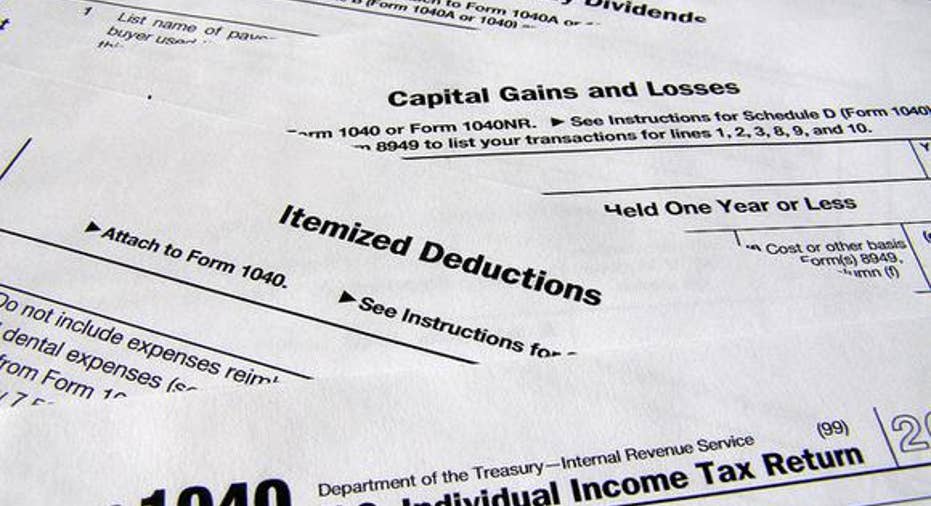The Average American Doesn't Itemize Deductions. Should You?

Image source: www.stockmonkeys.com
According to IRS data, only 30% of taxpayers decided to itemize deductions for the 2014 tax year, with the remainder choosing the standard deduction instead. While the standard deduction is indeed easier, taxpayers need to itemize in order to take advantage of tax deductions such as mortgage interest, charitable contributions, property taxes, and other deductible items. Here's a quick guide to the two deduction methods, and how to know which one you should use.
What does it mean to "itemize"?When it comes to tax deductions, you have two choices. You can take the standard deduction, which is a flat amount to be subtracted from your taxable income. Or, you can choose to itemize, which means to add up all of your individual deductible items and subtract this amount from your taxable income instead.
The standard deduction amount depends on your filing status. For the 2016 tax year, the standard deductions are:
|
Filing status |
Standard deduction |
|---|---|
|
Single |
$6,300 |
|
Married (filing jointly) |
$12,600 |
|
Married (filing separately) |
$6,300 |
|
Head of household |
$9,300 |
|
Surviving spouse |
$12,600 |
In addition, taxpayers get a personal exemption amount of $4,050 per person, including you, your spouse, and each of your dependents. This has nothing to do with your deductions and reduces your taxable income whether or not you itemize. However, it does begin to phase out for incomes about $259,400/$311,300 (single/married), and disappears completely above $381,900/$433,800.
In a nutshell, itemizing your deductions is worth it if the amount of your deductions is greater than your corresponding standard deduction. However, there is one more thing to consider: the deductions you can take without itemizing.
You can use some deductions, even if you don't itemizeSome deductions are not "deductions" at all, but are considered adjustments to income instead. This means they can be taken whether or not you choose to itemize. Although the list changes from time to time, adjustments to income for the 2016 tax year include:
- Qualified retirement contributions made to a pre-tax account (traditional IRA and 401(k) are most common).
- Student loan interest -- up to $2,500 per year
- Tuition and fees -- Note that you can only take this adjustment if you aren't claiming one of the educational tax credits instead.
- Educator expenses -- K-12 classroom teachers can deduct up to $250 in out-of-pocket classroom expenses each year.
- Moving expenses -- If you moved for work-related reasons, the costs associated with the move can reduce your taxable income, provided certain conditions are met.
- Alimony paid -- As long as it's made as a condition of a divorce decree or separation agreement, alimony is a tax break for the payer, and is taxable income for the payee.
- Bad debt -- If someone owes you money that you cannot collect, it can be an adjustment to income.
The point here is that if any of these apply to you, it should have no bearing on whether or not you decide to itemize. Your standard deduction amount won't be affected, no matter how much these adjustments add up to.
How do you know whether to itemize or not?As I mentioned earlier, itemizing is the way to go if your deductions add up to more than your standard deductions. And, while there are lots of potentially deductible items, here are some of the most common:
- Mortgage interest
- Mortgage insurance
- Property taxes
- State and local income taxes or sales taxes
- Foreign income tax
- Personal property taxes (like car taxes)
- Points you paid when obtaining your mortgage
- Charitable contributions
- Casualty and theft losses
- Investment expenses
- Medical expenses in excess of 10% of your AGI (7.5% if you or your spouse is over 65)
- Job-search expenses (in excess of 2% of AGI)
So, a good way to gauge whether or not itemizing could be the way to go is to get out a pen and paper (or calculator) and add up the value of any of these deductions you may qualify for.
As an example, let's say that I'm married and paid $6,000 in mortgage interest, $2,000 in property taxes, $1,500 in state income taxes, $3,000 in charitable contributions, and $500 in car taxes. This adds up to $13,000, which is more than the standard deduction of $12,600. Therefore, it is probably in my best interest to itemize.
A lengthy process, but it could be well worth your timeThe bottom line here is that itemizing deductions could put more money in your pocket than the standard deduction, but this isn't the case for everyone.
If little or none of the listed deductions apply to you, go ahead and take the standard deduction and save yourself the time. However, my suggestion is that if you look at the list of deductions and there's even a remote possibility that yours will add up to more than the standard deduction, it's worth doing a thorough calculation just to be sure.
The article The Average American Doesn't Itemize Deductions. Should You? originally appeared on Fool.com.
Try any of our Foolish newsletter services free for 30 days. We Fools may not all hold the same opinions, but we all believe that considering a diverse range of insights makes us better investors. The Motley Fool has a disclosure policy.
Copyright 1995 - 2016 The Motley Fool, LLC. All rights reserved. The Motley Fool has a disclosure policy.



















